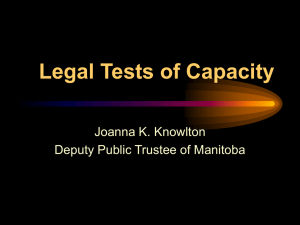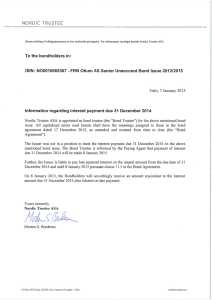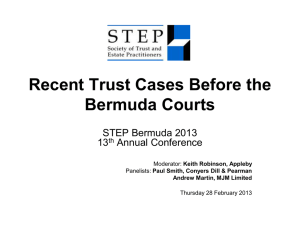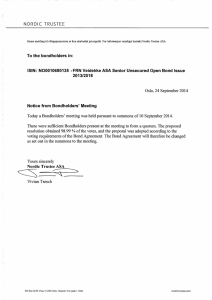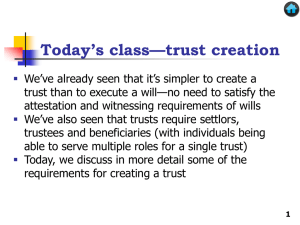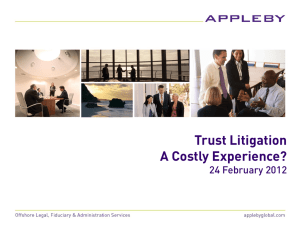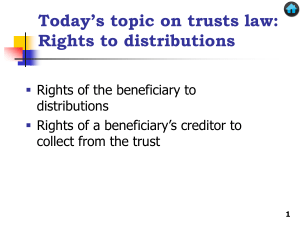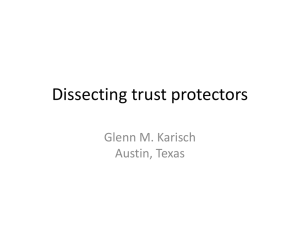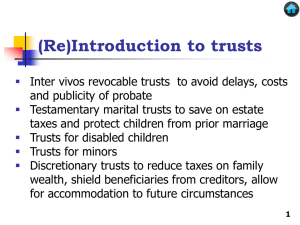Denis Barlin - CST Corporate Solutions
advertisement
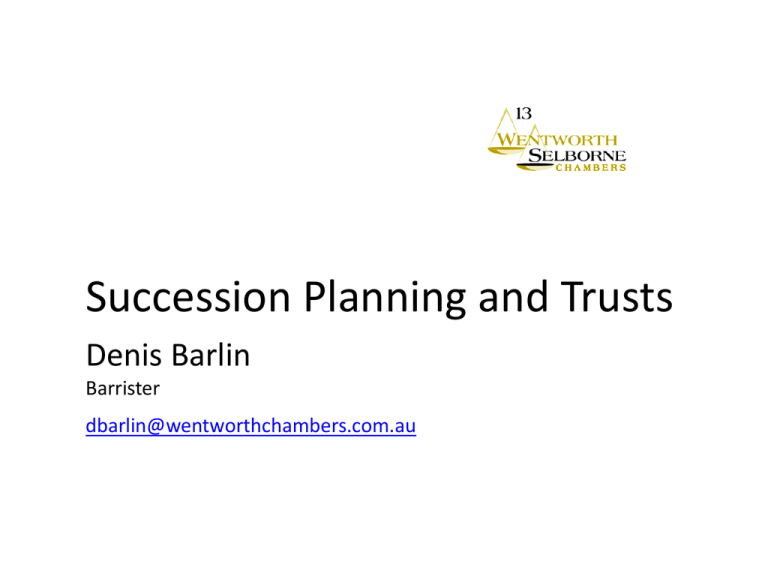
Succession Planning and Trusts Denis Barlin Barrister dbarlin@wentworthchambers.com.au Overview • Transferring wealth and control held subject to a trust • Cloning and splitting of trusts • Present entitlement and estate considerations Transferring Wealth & Control of Trusts • • • • • • Terms of trust More than one trust? Appointor / trustee? Family provision Asset protection Family law Objects Indemnity? Trustee Appointor Powers Trust Trust Indemnity Trust Property * Note: both powers and trust enable the trustee to take action, but trust is obligatory whilst power is discretionary Control of Trusts • • • • No appointor – corporate trustee Movement of shares in corporate trustee Part of estate Other positions Cloning or Splitting STARTING POINT TRUSTEE 1 ______________ Appointor 1 DISCRETIONARY TRUST Parcel 1 assets Parcel 2 assets Cloning or Splitting ‘Splitting’ One trust relationship but separate trustees Appointor 1 DISCRETIONARY TRUST TRUSTEE 1 TRUSTEE 2 Parcel 1 Assets Parcel 2 Assets Appointor 2 Cloning or Splitting ‘Cloning’ – Transfer to New Trust TRUSTEE 1 TRUSTEE 2 DISCRETIONARY TRUST 1 DISCRETIONARY TRUST 2 Parcel 1 Assets Parcel 2 Assets Splitting – The Drivers • Nominal or no stamp duty – NSW: Subsection 54(3) Duties Act 1997 (NSW) – ACT: Subsection 54(2) Duties Act 1999 (ACT) – VIC: Subsection 33(3) Duties Act 2000 (Vic) – QLD: Section 117 Duties Act 2001 (Qld) – WA: Subsection 119(3) Duties Act 2008 (WA) – SA: paragraphs 71(5)(d) Stamp Duties Act 1923 (SA) Why Split or Clone • • • • • • Incapable of joint decisions Ability of family members varies greatly Imperfectly blended families Different financial needs Different financial exposures Succession planning Splitting - Resettlement • New Trustee New Trust Relationship (Theory) • Re Ball’s Settlement • Resettlement principles Splitting - Resettlement • Appointment of separate trustees NSW: Section 6 Trustee Act 1925 (NSW) ACT: Section 6 Trustee Act 1925 (ACT) VIC: Section 42 Trustee Act 1925 (Vic) QLD: Section 12 Trusts Act 1973 (Qld) WA: Section 7 Trustees Act 1962 (WA) SA: Section 14A Trustee Act 1936 (SA) Varying Deed • Change substratum? • Separate appointor • Family Trust Elections Splitting – The CGT Events • Event A1 – ‘merely because of a change of trustee’ • Events E1 / E 2 • Events E3 / E4 – not relevant • Event E5 – beneficiary becoming absolutely entitled Splitting – Tracing Assets • indemnity from trust assets • creditors right to be subrogated • trustee only liable for own acts and liabilities subsection 59(2) Trustee Act 1925 (NSW) • liability incurred after split Splitting – Tracing Assets • equitable lien over assets • Coates v. McInerney (Anderson J) • Rothmore Farms (Mansfield J) – Equitable tracing • If can exclude indemnity may limit tracing Splitting – Tracing Assets • Bankruptcy Act 1966 (Cth) – Section 120 – Section 121 – Division 4A • Corporations Act 2001 (Cth) – Uncommercial transaction – Insolvent transaction – Section 197 (Hanel v. O’Neil) Other Issues • Trustee’s Duties • Tax Returns • Splitting Unit Trusts • Splitting hybrid trusts Splitting – ATO ID 2009/86 • appointment of a separate trustee to hold certain trust assets (either the passive or active assets) would be a resettlement • CGT event E1 • Substantial alteration of the trust relationship to cause resettlement: 1. Trustee’s rights are altered – original trustee has no recourse to assets held by new trustee 2. Beneficiaries’ rights are altered – assets held by new trustee held exclusively for Y family members Clark v. Commissioner of Taxation [2009] FCA 1401 Cloning • CGT event E1 and E2 exemption • Press Release No. 092 • Tax Laws Amendment (2009 Measures No. 6) Bill 2009 – received royal assent on 24 March 2010 • Roll-over – fixed trusts Fixed Trust Roll-over • Assets transferred from ‘transferring trust’ to ‘receiving trust’ • Eligibility: 1. Both trusts eligible 2. Same beneficiaries with same interests 3. No exception applies Fixed Trust Roll-over 1. Both trusts eligible – Beneficiaries’ interests in each trust must satisfy requirements: (a) interest in or rights to income and/or capital; (b) Nature and extent ascertained in trust instrument (c) No powers to: (i) materially alter interest; or (ii) issue / redeem at 10% discount (d) CGT event E4 can occur (e) Receiving trust ‘clean skin’ (f) Both trustees choose to obtain roll-over Fixed Trust Roll-over 2. Same beneficiaries with same interests (a) Same beneficiaries; (b) Receiving trust have same class of membership interest as transferring trust (c) Market value of interest same Fixed Trust Roll-over 3. Exceptions (a) Receiving trust is foreign trust and asset not Australian property; (b) Transferring trust or receiving trust is corporate unit trust or public trading trust; (c) Transferring trust and receiving trust – same tax choices & elections Fixed Trust Roll-over • Defer capital gain or capital loss • Cost base of beneficiaries’ interest apportioned across interest in transferring trust & receiving trust • Cost base: RT = TT • Stamp duty still an issue Present Entitlement – estate considerations • Unpaid present entitlements • Asset of deceased • Executor required to call in assets Wood v Inglis [2009] NSWSC 601 • Dr Inglis, wife & children – beneficiaries • Trust fund invested in shares • Accounts – movements in net value on income account • Unrealised gains – income on which beneficiary presently entitled Wood v Inglis [2009] NSWSC 601 • Dr Inglis left residuary of estate to wife • Issues: 1. Whether trustee can treat increase as income? 2. Whether trustee in fact did treat increase as income? • If so, then: 1. Did trustee made the distributions? 2. Did trustee discharge obligations to pay the distributions? Wood v Inglis [2009] NSWSC 601 • If movement is income – present entitlement & residuary estate • If not income – asset of the trust Wood v Inglis [2009] NSWSC 601 • Trustee could treat movement as income – ‘profit’ can be made even if not realised – Trust deed confirmed this • Trustee did in fact resolve to include unrealised gains as income – Change of accounting method – Inglis – controlling mind of corporate trustee – Approved trust accounts by Inglis Wood v Inglis [2009] NSWSC 601 • Distributions were validly & effectively made – Beneficiary loan account • Estate did not release trustee from debt Wood v Inglis [2009] NSWSC 601 • Unpaid present entitlement important • Asset of deceased • Executor may call in
